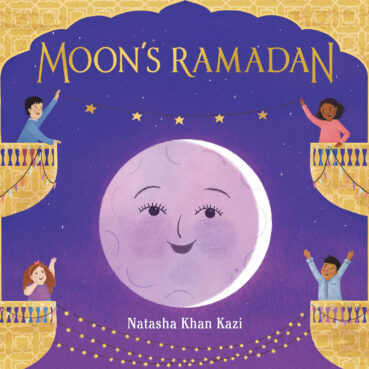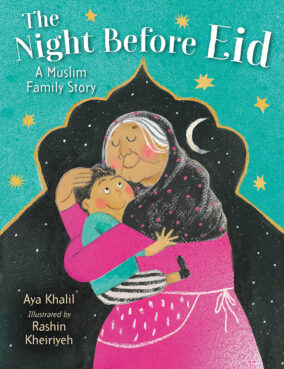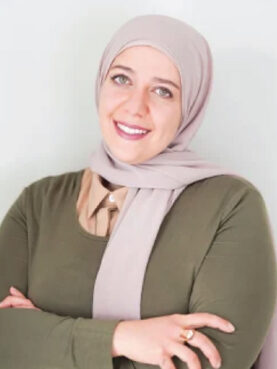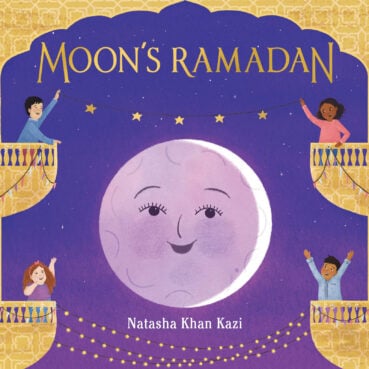
(RNS) — When Natasha Khan Kazi was a student at the University of Pittsburgh in the early aughts, Eid al-Fitr — a major Muslim holiday that marks the end of a monthlong fasting during Ramadan — fell just before Christmas break. So while many of her classmates went through finals week anticipating the warmth of holiday gatherings a few days later, Khan Kazi spent her Eid in a crowded classroom bent over her exams.
“There were so many moments growing up where I wasn’t seen or acknowledged, or all the joy I felt for my celebration was quieted,” she told Religion News Service recently.
So when Khan Kazi saw earlier this month that Target, the big-box store and online retailer, had included her recently published children’s book, “Moon’s Ramadan,” in its first Ramadan and Eid holiday collection, “I was speechless,” she said. “It was being seen, and being acknowledged, it was showing that our celebration mattered.”
“Moon’s Ramadan” by Natasha Khan Kazi. Courtesy image
Target isn’t the only national outlet to put Ramadan on its radar this year. From Party City to West Elm, Eid and other minority religious holidays are starting to gain traction in mainstream spaces.
For years, companies including Starbucks and Tyson Foods have been promoting religious inclusion among their employees, hosting religious literacy trainings or hiring interfaith chaplains. But increasingly they are seeing a market in the Muslim community.
“There was a strategic move of these corporations to tap into the buying power of the (Muslim) community that they’ve been kind of ignoring for a while,” said Liz Bucar, religious ethicist at Northeastern University in Boston and author of “Stealing My Religion: Not Just Any Cultural Appropriation.”

Natasha Khan Kazi, author of “Moon’s Ramadan.” Photo by Farshid Kazi
Bucar first noticed the trend of Muslim-friendly products around 2017. That year, a Pew Research Center survey found that U.S. adults had warmer feelings toward Muslims compared with 2014, though 50% of the 2017 respondents still said Islam is not part of mainstream society. But a key piece, she added, is the emergence of creative Muslim entrepreneurs such as Khan Kazi.
Born in Dhaka, Bangladesh, and now living in Southern California, Khan Kazi began thinking about writing “Moon’s Ramadan” in 2019 after she visited her son’s preschool classroom and found few resources for young readers to encounter Ramadan. Her book — which she illustrated herself in deep blues and purples — follows the moon as it views Ramadan celebrations in New Zealand, Indonesia, Egypt and the United Kingdom. The book introduces readers to traditions such as Suhoor, the meal eaten before sunup, and Taraweeh prayers performed at Sunni Muslim mosques after the day’s fast ends at sundown.
Like Khan Kazi, author Aya Khalil told RNS that Ramadan and Eid were often overlooked in the small Ohio and North Dakota towns where she grew up. “Christmas looked a lot more fun, especially in the classroom, where people shared their Christmas books and gifts,” she recalled.
Khalil’s children’s book “The Night Before Eid,” released March 7, tells the story of an Egyptian American family that bonds over making ka’ak, powdered sugar-covered sweets. At the back of the book is Khalil’s recipe for ka’ak, along with photos of her Eid celebrations with her family today.

“The Night Before Eid” by Aya Khalil. Courtesy image
“There’s a lot for anybody to relate to,” she said of her story: intergenerational family parties, baking, picky eaters, wanting to impress your friends. “And for Muslim and Arab kids, there are Arab words, references and music. There are very few picture books written by Arab authors.”
Khalil had been told months ago that her book would be sold on Target’s shelves, but she didn’t believe it until she saw it in person.
“It’s a huge deal that major stores are finally including us. It’s just nice that for kids now just growing up, it will be a normal thing. … It wasn’t a norm for us.”
Khalil’s editor, Jessica Anderson of Christy Ottaviano Books, told RNS via email that Target has been adding titles about the Lunar New Year, Diwali and Día de los Muertos to its shelves as well.
While Khalil appreciates corporate retailers taking an interest in Ramadan and Eid, Khalil pointed to a 2018 video tutorial from MAC Cosmetics demonstrating how to apply eye shadow and mascara for Suhoor, the pre-dawn meal.
“It’s like at 4 o’clock in the morning when we wake up to eat breakfast,” said Khalil, laughing. “Who dresses up for Suhoor when everybody is in their pajamas?”

Aya Khalil. Courtesy photo
Efforts to market to minority faith communities can be fraught, even offensive. The gaffes have historically been so plentiful — menorahs with the wrong number of candles or Hanukkah gnomes — they’ve inspired an entire Instagram account.
“The question really starts with, is the corporation just doing this trying to leverage a market they know is out there, or is it really part of a bigger commitment to representation, diversity, inclusion?” asked Bucar.
Though some companies have a ways to go when it comes to religious literacy, both Khalil and Khan Kazi said they are excited about the recent interest in Ramadan and hope their books eventually work to help children of all religious backgrounds feel seen.
“I want Muslim kids to read it and feel proud that their holidays are featured, and that their food is featured, and Arabic words are written in there,” said Khalil. “I want them to feel seen and proud of their culture, tradition, holidays and religion.”

